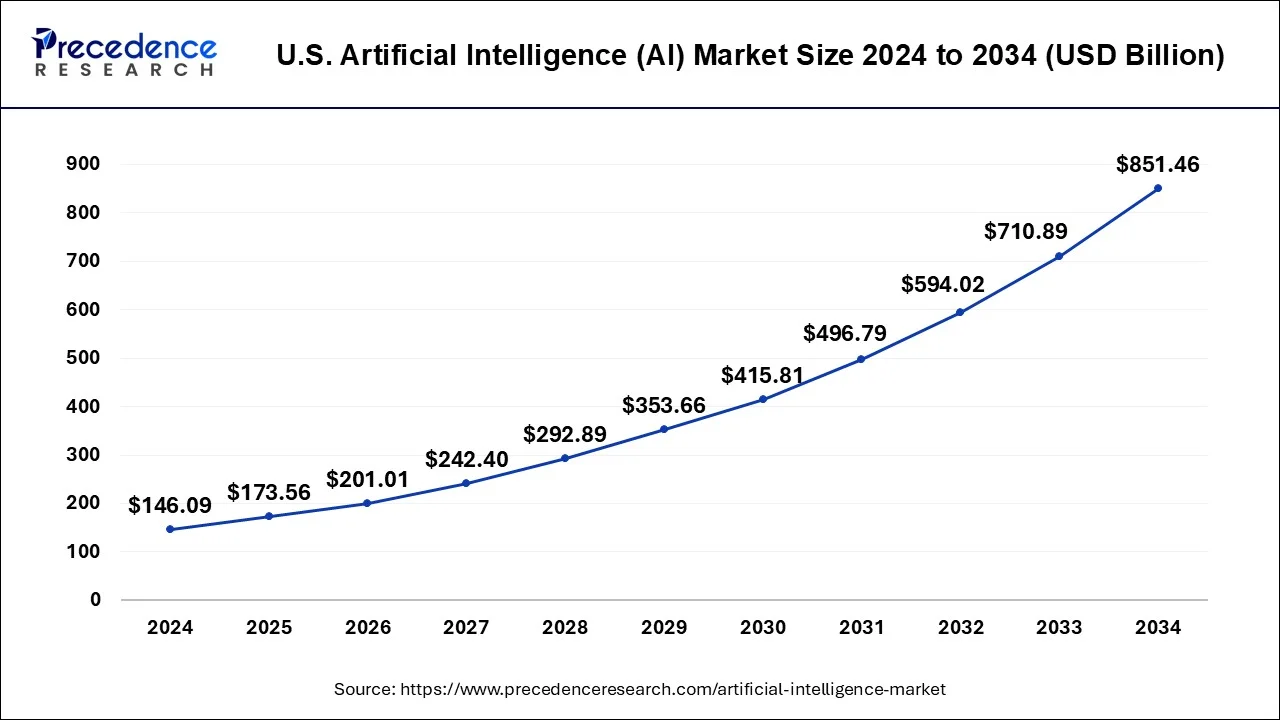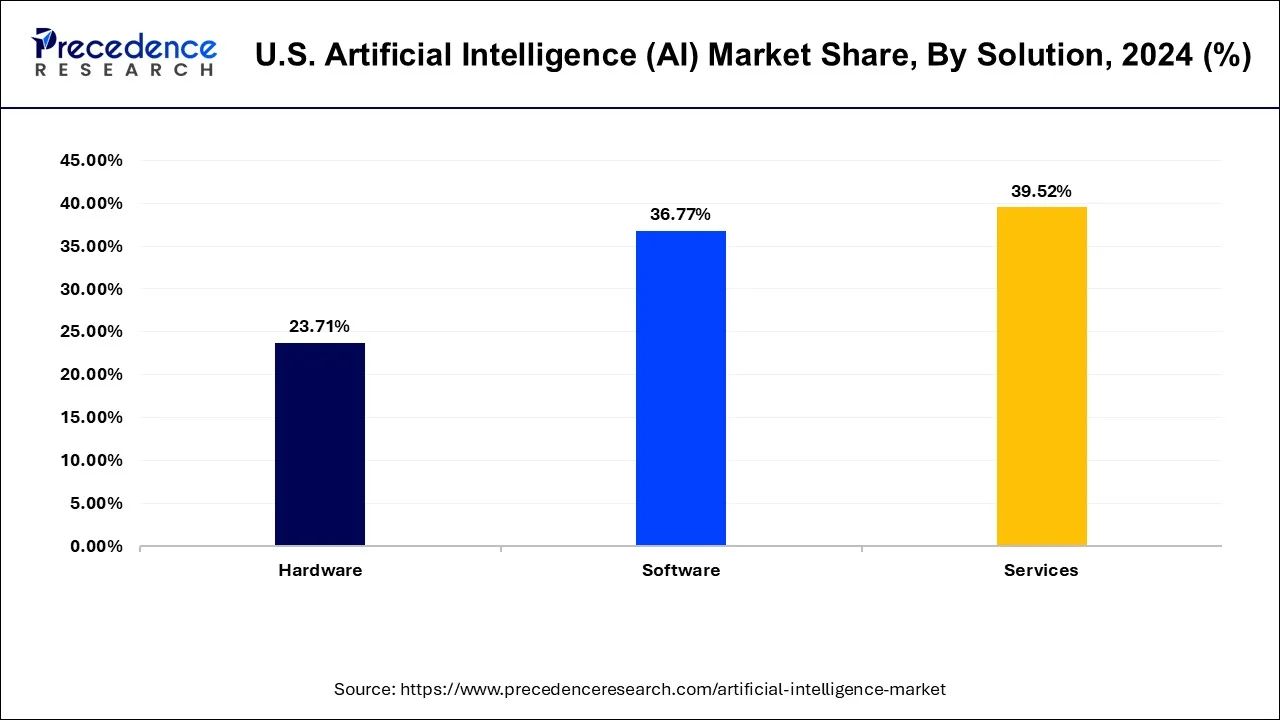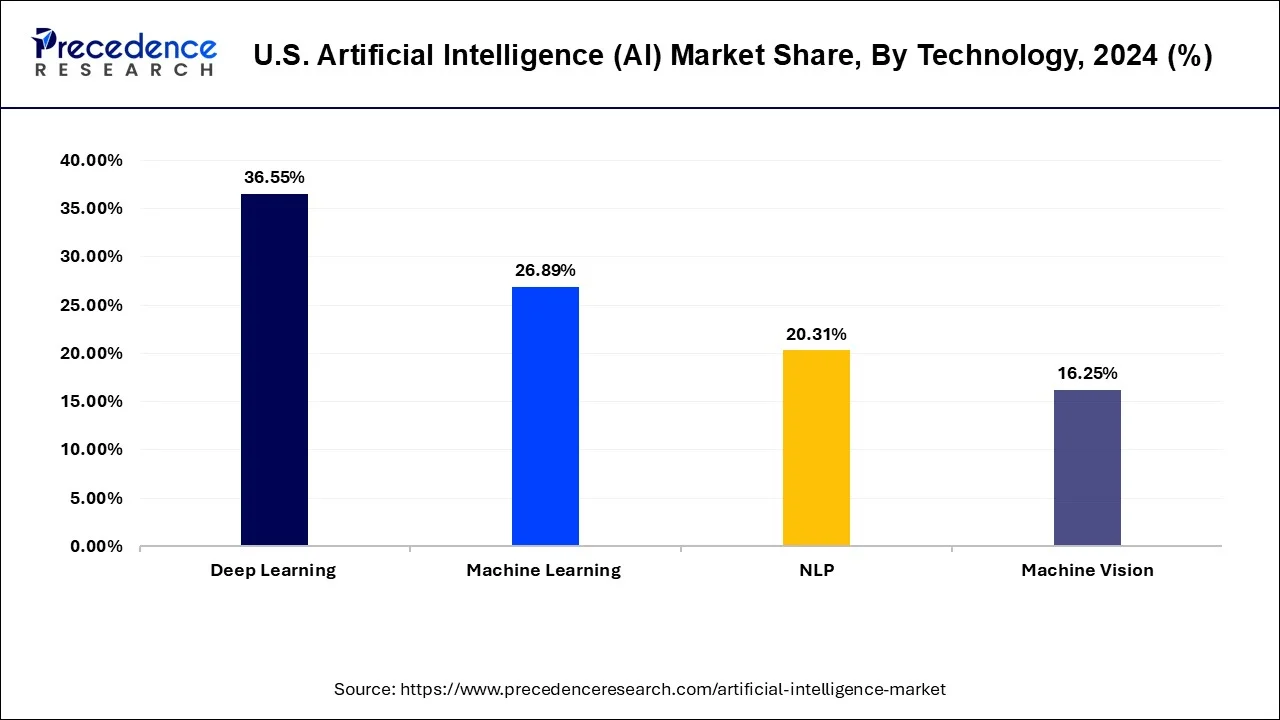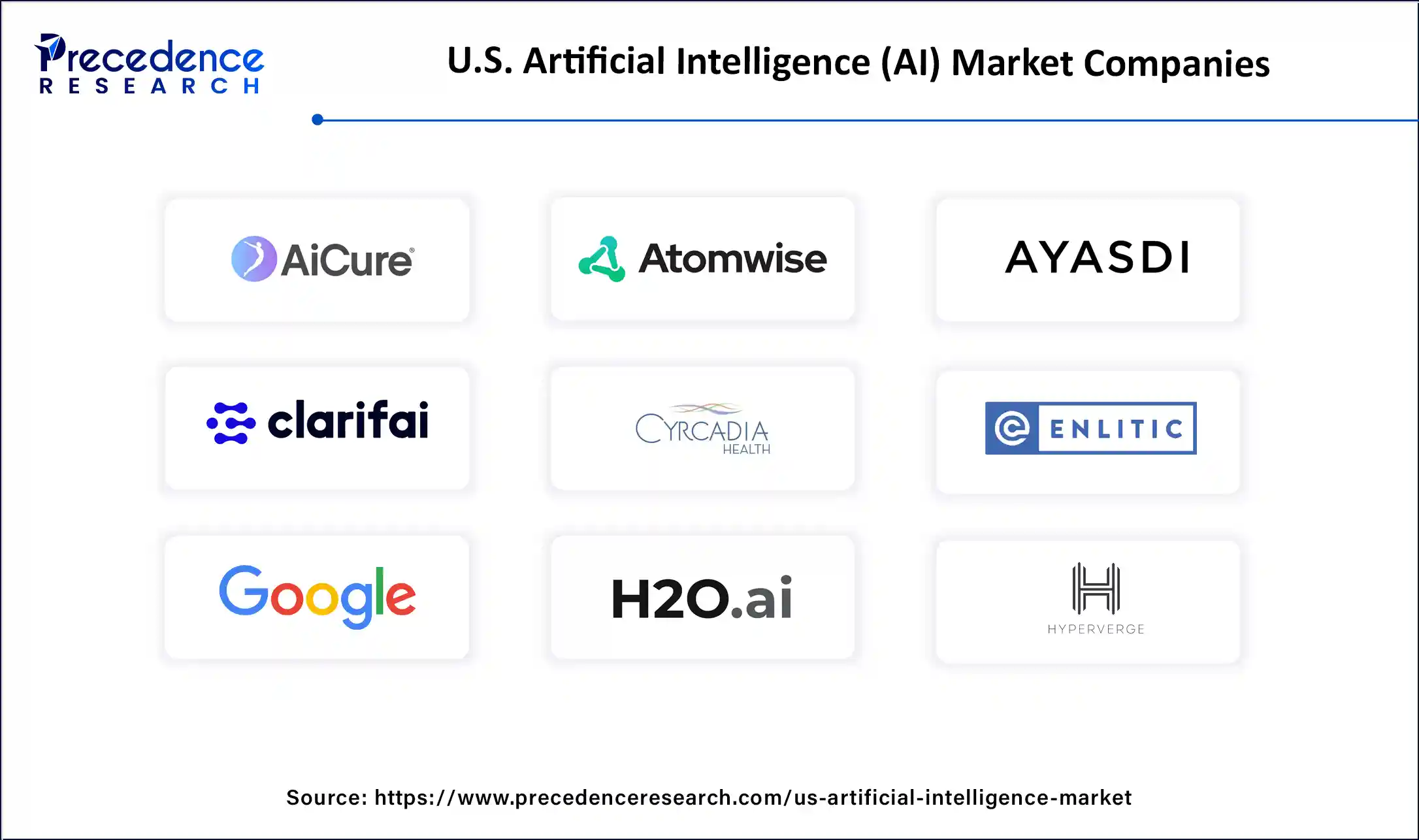What is U.S. Artificial Intelligence (AI) Market Size?
The U.S. artificial intelligence (AI) market size accounted for USD 173.56 billion in 2025 and is expected to reach around USD 976.23 billion by 2035, expanding at a CAGR of 19.33% from 2026 to 2035. The rising demand for artificial intelligence for improving the efficiency and productivity in the businesses that drives teh expansion of the market.

Market Highlights
- By solution, the services segment dominated the market with a share of 39.52% in 2025.
- By technology, the deep learning segment dominated the market with a share of 36.55% in 2025.
- By end use, the BFSI segment dominated the market with a share of 16.92% in 2025.
- By technology, the NLP segment is anticipated to show considerable growth in the market over the forecast period.
- By end-user, the healthcare segment is anticipated to show considerable growth in the market over the forecast period.
Market Overview
Artificial intelligence is the recent advancements in technology, it is the computer systems that allows to perform the complex tasks like analysis, reasoning, solving problems, and making decisions. Artificial intelligence is used in a wide range of applications and industries like healthcare, telecommunication, automotive, electronics, and others. Artificial intelligence plays an important role in the business operations to automate the tasks including consumer service work, fraud detection, lead generation and quality control. The artificial intelligence is helps in increasing efficiency and creates the various new opportunities for the growth of the U.S. artificial intelligence market.
U.S. Artificial Intelligence (AI) Market Growth Factors
- The rising adoption of artificial intelligence in the various commercial and personal purposes that driving the expansion of the artificial intelligence in the market.
- The rising artificial intelligence application in the various industrial process such as healthcare, consumer electronics, automotive, and others in the United States is driving the growth of the U.S. artificial intelligence market.
- The increasing technological adoption and the integration of smart technologies in the commercial and domestic applications accelerated the demand for artificial intelligence in the market.
- The artificial intelligence organization are continuously engaging in the collaboration and partnership for advancements in the technologies are further contributing in the growth of the U.S. artificial intelligence market.
- The advancement in the AI-chatbots and virtual assistants is highly used in customer service and support that aims to improve the customer experience is driving the growth of the market.
Market Scope
| Report Coverage | Details |
| Market Size in 2025 | USD 173.56 Billion |
| Market Size in 2026 | USD 201.01 Billion |
| Market Size by 2035 | USD 976.23 Billion |
| Growth Rate from 2026 to 2035 | CAGR of 19.33% |
| Base Year | 2025 |
| Forecast Period | 2026 to 2035 |
| Segments Covered | By Solution, By Technology, and By End Use |
Market Dynamics
Drivers
Artificial intelligence in healthcare
The rising adoption of the artificial intelligence technologies in the healthcare sector in the applications like medical diagnosis, data analysis, drug trials and development, pain management, improving patient outcomes, in pharmaceuticals and others contributing to the growth of the U.S. artificial intelligence market. Artificial intelligence helps in the diagnosis of patients with specific diseases. The number of major pharmaceutical industry is integrating the artificial intelligence for helping in the drug discovery process and reduces the lengthy process of discovering and launching drugs to the market.
Artificial intelligence also helps with the huge amount of data set aiming to help the physician to make informed decisions and manage the patient information effectively. It also helps in the personalized medicine for the better treatment with analyzing the patient data and identifying treatment options. The increasing investment by the U.S. government and major industry leaders on the integration of artificial intelligence, machine learning, and other technologies in the healthcare industry is accelerating the growth of the U.S. artificial intelligence market.
Restraint
Lack of skilled professionals
Shortage of the skilled professionals and the high cost of implementation of AI solutions in the organizations are the major factors that are limiting the expansion of the U.S. artificial intelligence U.S. artificial intelligence market. However, the emergence of Ai-related courses in academics to leverage the significance of AI in multiple industries in the United States is observed to create a solution for the hindering factor.
Opportunity
The investments on the AI research and development
Key players in the United States are focused on increasing federal investment in the artificial intelligence research and development in the collaboration with the academia, industries, international alliances and partners and other non-governmental entities for generating advancement in the artificial intelligence. The United States is investing on the research on the minimizing the challenges for the safer testing, development, deployment, and adaptation of AI technologies. The collaboration of the public and private sector allows strategic leveraging of resources, expertise, and datasets. It also enhances the transformation in research innovations to practices using expertise to published research into the services and products to the marketplace for economic growth.
Segment Insights
Solution Insights
The services segment dominated the U.S. artificial intelligence market with the share of 39.52% in 2024. Artificial intelligence as a service is employed in large enterprises as well as small enterprises. The employment of artificial intelligence is necessary especially with the amount of advantages Al offers in business management. Additionally, the field of artificial intelligence has experienced ground-breaking advancements in recent times and machine learning techniques have the ability to provide promising results to companies.
As a service, Al can be employed in any branched company especially in current times. Companies that adopt Al and machine learning benefit from a reduction in overall costs as it allows them to cut down the cost on development and research by providing the information by Al, without getting financially involved with the third-party companies.
Further, along with the cost, Al also assists the companies in speeding up the work. Additionally, the Al service provides the company with the required training in how to code and thereby develop complex multi-level infrastructure and hire experts. Also, these services allow the company to customize by corresponding with the data, business and project's needs.

The software segment is expected to show significant growth in the market during the forecast period. Artificial Intelligence as a software is making a wider shift in many sectors as Al systems streamline software development process such as quality testing. Code compilation and reduction of costs and time are a few significant advantages of the same. For example, Al software tools of Google cloud allow developers to work on machine learning design in a cost-effective and time saving manner.
Also, it allows the access of various pre- trained cloud API in order to build machine learning applications such as natural language, computer vision, translation, video, etc. Furthermore, Al as a software enables the execution of complex tasks without any cost outlays. Also, it drives down the time that is used in performing a task. Furthermore, Al software can be operated 24/7 without any interruption or any down time as well as Al software plays with a huge data and reduces human errors, automates the repetitive tasks and processes and facilities quick decision making.
On macro level, the Al services for the organizations are used for:
- Inventory Maintenance: Maintaining inventory can be a time-taking and tedious task especially in the large enterprises that deal with huge amounts of it. Inculcation of Al makes it easy to systemize and saves a lot of time and efforts.
- Complex data analysis: Large enterprises as well as small enterprises employ Al services for segregating the data. Complex data and factsheets are difficult to calculate manually but use of Al makes it simple and understandable.
- Reduction of work pressure: Use of chatbots for customer queries, handling comments can ease multiple tasks and reduces the pressure on employee's and they can focus on other work thereby increasing the efficiency of the company.
- Help in research and development: Information provided by Al helps the organization to employ that information for further research rather than making use of third-party.
Technology Insights
The Natural Language Processing (NLP) segment is expected to grow at a significant CAGR over the forecast period. Such NLP-type technologies as Interactive Voice Response (IVR), real-time translation, chatbots, and virtual assistants are changing the way businesses operate in any industry because they help make machines interact with users in a human-like way. These tools can significantly enhance user interaction, decrease the cost of doing business, and increase the effectiveness of the services they offer due to the automation of the response, receiving of the data straight from the sources, and provision of personalized experiences.

Furthermore, NLP can help organizations to efficiently process and analyze large volumes of unstructured information in the form of texts, which provides them with valuable information and improves the decision-making processes in general. It is also provided by the improved application of natural language generation (NLG) and sentiment analysis, which is vital in marketing, finance, healthcare, and customer support services.
End-use Insights
The healthcare segment is expected to grow substantially in the US artificial intelligence market. The use of AI technologies is completely changing healthcare by simplifying diagnosis, creating better treatment plans, better patient outcomes, and reducing time. The results of the lab, electronic medical records (EMRs), computed tomography scans, and Magnetic resonance imaging can be analyzed through machine learning algorithms, and based on this analysis, there can be found patterns or imperfections that are overlooked by human clinicians.
Moreover, AI can speed up drug invention and advancement through molecular behavior forecasting, the acquisition of new drug targets, and drug combination prediction, thus lessening the amount of time and money expected to bring a new treatment into the market.
Use of AI is also diversifying clinical trials by optimizing the selection of participants and their real-time monitoring. The U.S. hospitals and research centers are growingly incorporating analytics-driven applications to streamline their processes and personalize patient experience with AI-based tools of robotic surgeries and virtual health assistants, and predictive analytics.
U.S. Artificial Intelligence Market Trends
The artificial intelligence industry in the U.S. is anticipated to exhibit a significant rate over the forecast period due to constant technological advances, high governmental support, as well as excellent research and development capabilities. The U.S. has become a world leader in innovating AI, and regional businesses, startups, and academicians have continuously tested the limits of AI and robotics potential. These initiatives have resulted in impressive advances in machine learning, natural language processing, computer vision, and autonomous systems, such that AI has become a component of different industries, such as healthcare, automotive, finance, and retail.
The explosion of edge AI and cloud computing is also supporting the implementation of AI-enhanced systems, which means that the systems can support real-time processing and decision-making processes. In addition, government actions, strategies, and policies that bolster AI ethics, regulatory models, and government-industry and partnerships help enforce the advanced status of the nation as an AI innovation hub. Investment in venture capital and alliances between leading tech companies and universities are also fast-tracking the commercialization of AI technologies.
- In January 2024, Microsoft became the second company ever to be valued at USD 3 trillion against the backdrop of AI investments and optimism. The news of the multibillion-dollar investment in OpenAI in January 2023 has boosted innovation in AI, and American goliath anticipates that the partnership would help create state-of-the-art AI research along with the democratization of AI.
U.S. Artificial Intelligence (AI) Market Companies

- AiCure
- Atomwise, Inc.
- Ayasdi AI LLC
- Clarifai, Inc
- Cyrcadia Health
- Enlitic, Inc.
- Google LLC
- H2O.ai.
- HyperVerge, Inc.
- International Business Machines Corporation
- IBM Watson Health
- Intel Corporation
- Microsoft
- NVIDIA Corporation
- Sensely, Inc.
Recent Developments
- In May 2024, The Department of Homeland Security (DHS) is regulating artificial intelligence for training officers for reviewing refugee status applicants in the United States.
- In May 2024, Mechanoid, a leading players in the automation and business optimization announced the launch of new software for the transformation of small business sales and marketing by artificial intelligence (AI) and automation.
Segments Covered in the Report
By Solution
- Hardware
- Software
- Services
By Technology
- Deep Learning
- Machine Learning
- NLP
- Machine Vision
By End-use
- Healthcare
- BFSI
- Law
- Retail
- Advertising & Media
- Automotive & Transportation
- Agriculture
- Manufacturing
- Others
For inquiries regarding discounts, bulk purchases, or customization requests, please contact us at sales@precedenceresearch.com
Frequently Asked Questions
Ask For Sample
No cookie-cutter, only authentic analysis – take the 1st step to become a Precedence Research client
 Get a Sample
Get a Sample
 Table Of Content
Table Of Content




 sales@precedenceresearch.com
sales@precedenceresearch.com
 +1 804-441-9344
+1 804-441-9344
 Schedule a Meeting
Schedule a Meeting